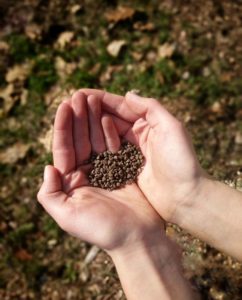Rebecca Hennessy lives in Portsmouth, NH and traveled to Nicaragua as a member of South Church in cooperation with the UUCSJ. She is a mother and a garlic farmer. She owns a small value-added food business, Backyard Garlic, coaches ultimate frisbee and likes exploring new places.
Memories of Nicaragua continue to organize in my mind and body. Reflections on being a part of a delegation as well as an individual have increasingly become a part of my daily life. For me, this is a sure sign of a good trip. One experience in particular, I hold carefully, as though it were alive in the palm of my hand.
On day 5 of our 8-day trip we travelled to Las Diosas farm to spend the afternoon. We shared a meal with the women working there and learned more about what happens from day to day. FEM and Las Diosas’ mission of rebellious attention to reproductive processes and resources were apparent everywhere we looked – through building local, to international markets, expertise in alternative farming techniques, and visionary business practices. The farm has a plant nursery, experimental garden, testing and processing facilities for hibiscus, coffee, and honey, and infrastructure to support continued growth of women owned and operated cooperatives. Also on the farm is the ongoing study and practice of saving seed.
I felt joy on this farm. In simply being there and in what I learned. And it was the practice of saving seed that is most present to me now. A seed can be deceptively simple. Profundity is a trait of simplicity, after all. And much can be said of the word – saving. Seed is potential, diversity. Seed is survival. And when a seed is understood for the qualities it brings to the plant, it begins to reveal the history of the soil from which it grew. From which, and in which, it can be saved.
In this way, seed is memory and soil is history. Both record human activity – present and past. Saving seed is an act of deep affection. It is an act of profound attention to what has gone before.
Knowing how to save seed is not unlike knowing how to raise a hand in protest. March 8 is International Women’s Day. And March 24 is March for Our Lives. For both, I will remember what I learned from the women of FEM and on the Las Diosas farm. I will care for the seed in my hand, how it roots me, saves me, in what I believe. I will work to have a deeper understanding of the history I inherited and the history in the making – it is the soil in which I grow. Saving is conserving as well as setting free.
We often heard the word ‘organized’ on our journey. For me the word organized came to mean – knowing who you are and what you bring to the work. It meant planting your words and actions with a rebellious attention, selective care and abundant joy.

